Bringing home a newborn is joyful yet challenging—especially when your little one seems newborn fussy at night but not during the day. You might have a perfectly content baby during sunlight, only to face hours of fussiness and crying after dusk. Often, it happens like clockwork – a newborn fussy at night but not during the day around the same time each evening. If this sounds familiar, you are not alone. Many new parents experience this pattern and wonder if something is wrong. The good news is that in most cases, it’s a normal phase of newborn development, and it will pass.
(Baby’s Witching Hour: Dealing With a Fussy Baby at Night) A tired mother comforts her newborn fussy at night but not during the day. Many infants have a “witching hour” in the evening when they become especially fussy.
Understanding why your newborn is calm in the daytime but fussy at night can help ease your worries. In this article, we’ll explain the common causes of a newborn being fussy at night, share effective soothing techniques to calm your baby, and suggest sleep strategies to help everyone get more rest. We also include an FAQ section with quick answers for concerned parents. With patience and the right approach, this phase will get better. Let’s explore why a newborn fussy at night but not during the day is a common occurrence, and how you can cope.
Table of Contents
Why Is My Newborn Fussy at Night but Not During the Day?
If your newborn is fussy at night but not during the day, you will likely see a combination of normal newborn behavior and developmental factors. Babies often have a daily fussy period in the late afternoon or evening, commonly called the “witching hour” ( Why Newborn Babies are Fussy in the Evening – Mommy’s Bliss). It can be perplexing when an otherwise content baby becomes hard to console after sundown. Here are the most common causes of newborn fussiness at night:
Undeveloped Circadian Rhythm (Day-Night Confusion)
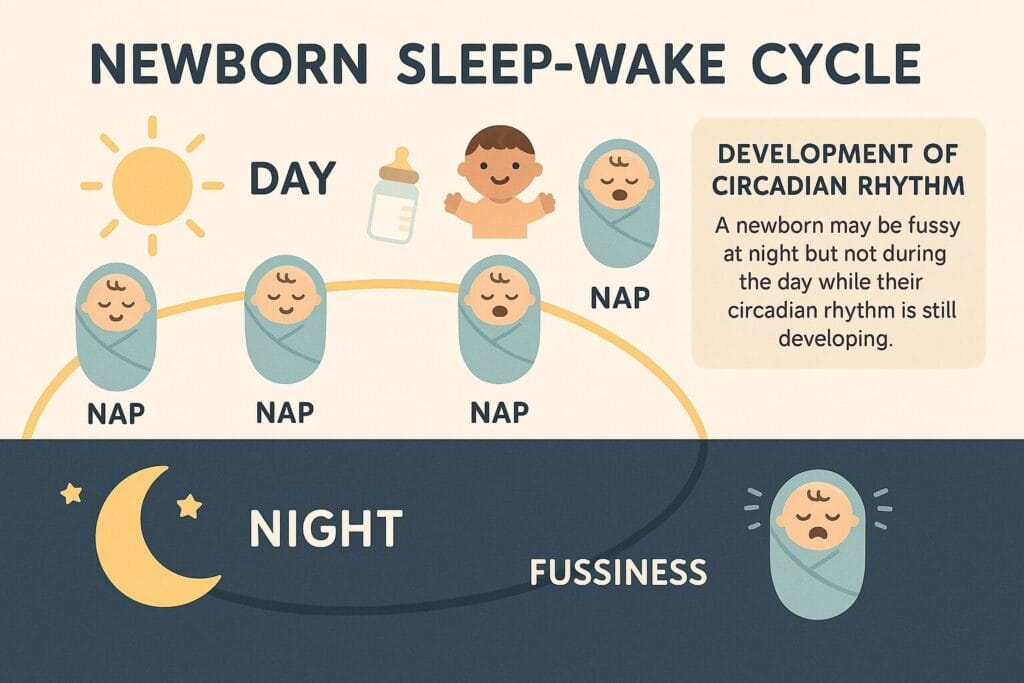
Newborns aren’t born knowing day from night. In the womb, they slept and woke on their own schedule. After birth, it takes time for their internal clock (circadian rhythm) to develop (Newborn fussy at night but not during the day). Early on, a baby’s sleep-wake cycle is driven more by hunger than by light or dark (Newborn fussy at night but not during the day). This often leads to day-night confusion: your baby might nap often in daylight but then be wide awake or fussy at night. The result is a newborn fussy at night but not during the day. This is temporary—circadian rhythms start developing around 6–12 weeks (Newborn fussy at night but not during the day). Gently help your baby adjust by keeping days bright and interactive and nights dark and quiet, and soon, they will learn that nighttime is for sleeping.
Normal Evening Fussiness (“Witching Hour”)
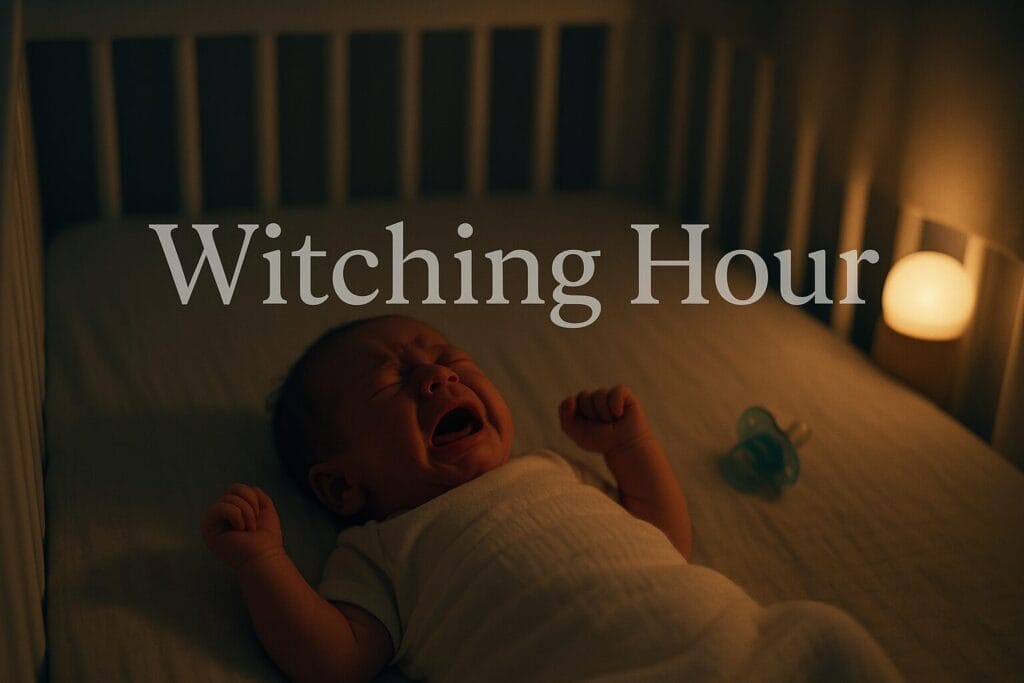
Almost all infants go through a phase of increased fussiness in the evenings. If your baby is calm during the day but turns fussy come evening, you’re likely experiencing the witching hour. In the first 2–3 months, many babies have a regular fussy time each day (usually late afternoon or early night) . It typically starts around 2 weeks old, peaks at about 6 weeks, and improves by 3–4 months. During this time, a baby might cry on and off for a couple of hours in the evening. It’s important to know this is normal and harmless ( Why Newborn Babies are Fussy in the Evening – Mommy’s Bliss), though it can be exhausting for you.
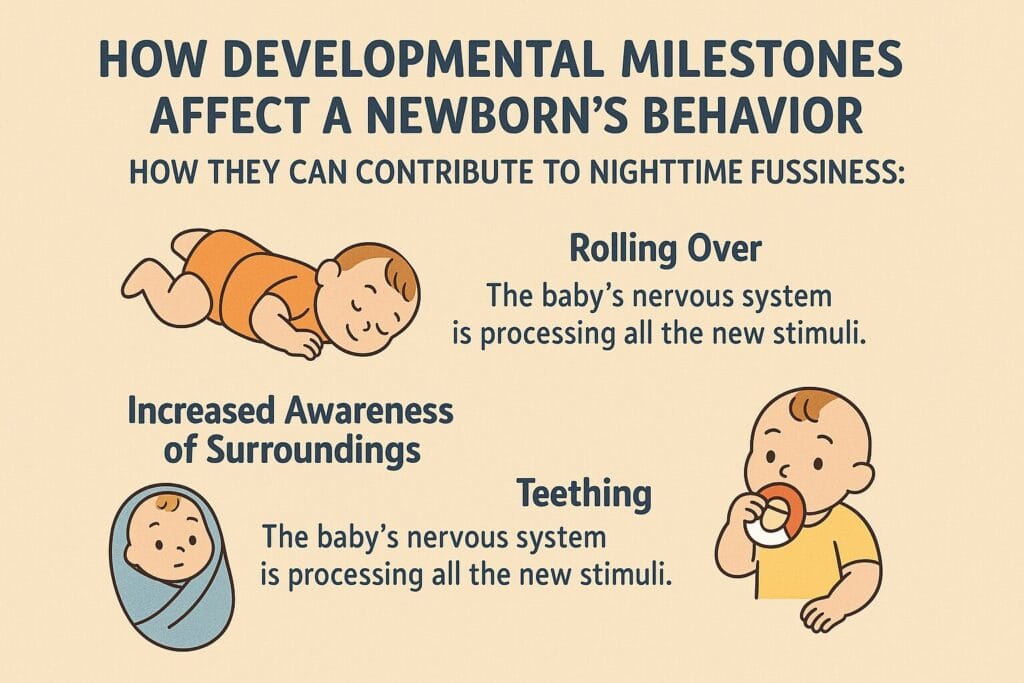
Why do fussy evenings happen? One reason is the baby’s developing nervous system – by day’s end, they’ve encountered a lot of new stimuli and can easily become overstimulated or overtired. Crying is their only way to release that tension and ask for help Think of it as your baby’s way of unwinding from the day. The good news: this daily evening fussiness tends to be time-limited and, as baby gets older, it will disappear. In short, the witching hour can leave even a content infant a newborn fussy at night but not during the day, but it’s a passing phase.
“Is it normal for a 7-month-old to not sleep through the night? Here’s what every parent should know.”
Overstimulation or Overtiredness
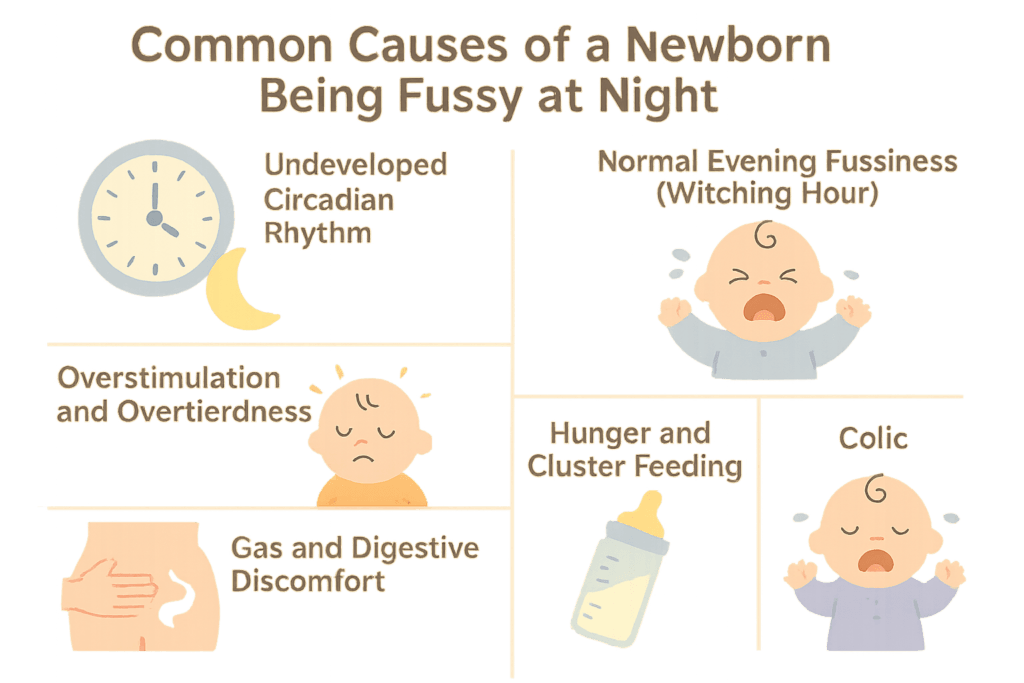
Newborns have a low tolerance for many stimuli. During the day, your baby encounters lights, sounds, and activities. By evening, all that input can catch up with them, resulting in a cranky, overstimulated baby ( Why Newborn Babies are Fussy in the Evening – Mommy’s Bliss). Similarly, if your baby missed naps or stayed awake too long, they can become overtired, which paradoxically makes it harder for them to settle at night ( Why Newborn Babies are Fussy in the Evening – Mommy’s Bliss) (Baby’s Witching Hour: Dealing With a Fussy Baby at Night). An overstimulated or overtired infant often ends up a newborn fussy at night but not during the day. To help, try to provide a calm late-day environment and watch for sleep cues. A baby who goes to bed before becoming overtired is less likely to have a giant meltdown at 9 p.m.
Hunger and Cluster Feeding
Many babies feed more frequently in the evenings, a behavior called cluster feeding. Your newborn might seem hungrier at night or want to nurse repeatedly for comfort. This is normal, and it’s baby’s way of stocking up calories for a longer sleep. However, if mom’s milk flow is slower in the evening (common due to natural dips in milk supply later in the day (Newborn Fussy at Night: Dealing With Witching Hour)), baby might get frustrated and extra fussy. Even formula-fed babies can be hungrier in the evenings due to growth spurts. The result is often a newborn fussy at night but not during the day due to evening hunger. Feeding on demand during these times is important. The fussiness often eases after a good feeding or after the cluster feeding session.
“Is your 5-month-old waking every hour? Discover the surprising causes behind this frequent waking and how to tackle it.”
Gas or Digestive Discomfort
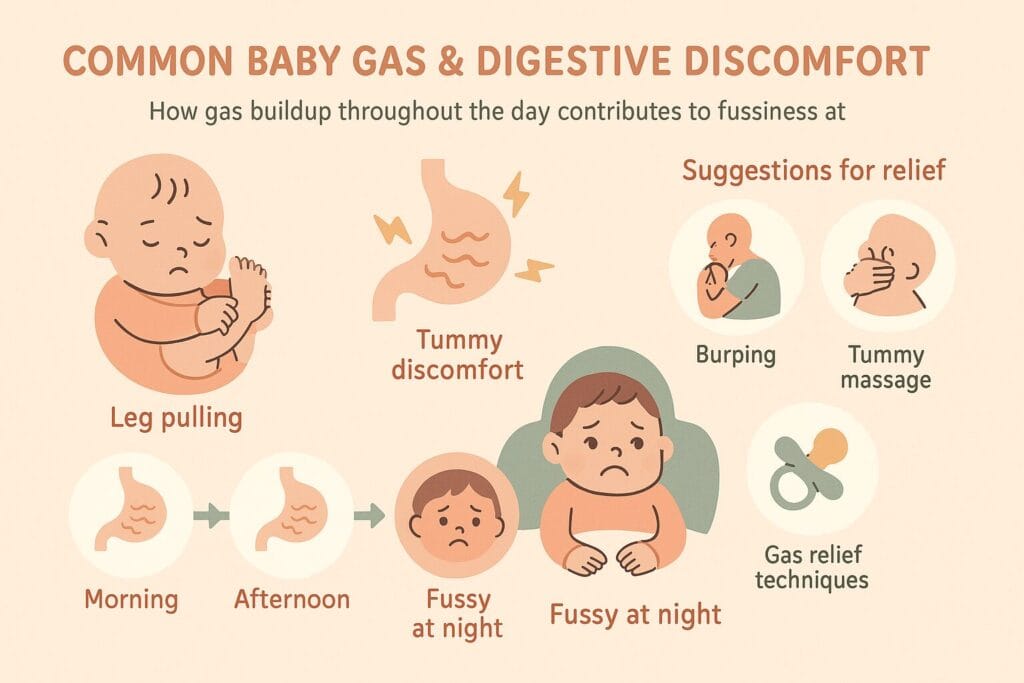
Gas pain is a common cause of newborn fussiness, and it can feel worse at night when babies lie flat. If your baby is pulling their legs up or arching their back while crying, they might have gas or an upset tummy ( Why Newborn Babies are Fussy in the Evening – Mommy’s Bliss). During the day, being held upright or moving around helps gas pass. At night, those gas bubbles can cause more discomfort and lead to a fussy, squirmy baby. Make sure to burp your baby well after evening feeds and consider gas relief techniques (like bicycling their legs or a gentle tummy rub). As their digestive system matures over the first few months, this discomfort can make a newborn fussy at night but not during the day, but it will improve as the baby grows.
Colic (Excessive Crying)
Colic is defined as intense crying for more than 3 hours a day, at least 3 days a week, for over 3 weeks (Newborn Fussy at Night: Dealing With Witching Hour). If your baby is only fussy at night but generally fine during the day, it’s probably not colic but just a newborn fussy at night but not during the day (normal evening fussiness). Colicky babies cry excessively at various times, not just in the evenings. However, colic usually peaks around 6 weeks too, often in the late afternoon or night. The soothing techniques for colic and normal fussiness are similar. If you suspect colic (crying seems truly nonstop, or the baby seems to be in pain), talk to your pediatrician for guidance. Otherwise, trust that typical evening fussiness will pass with time.
Bottom line: There are many reasons for a newborn fussy at night but not during the day, most of which are normal. Next, we’ll discuss how to soothe your baby during those fussy nights.
Soothing Techniques for a Newborn Fussy at Night
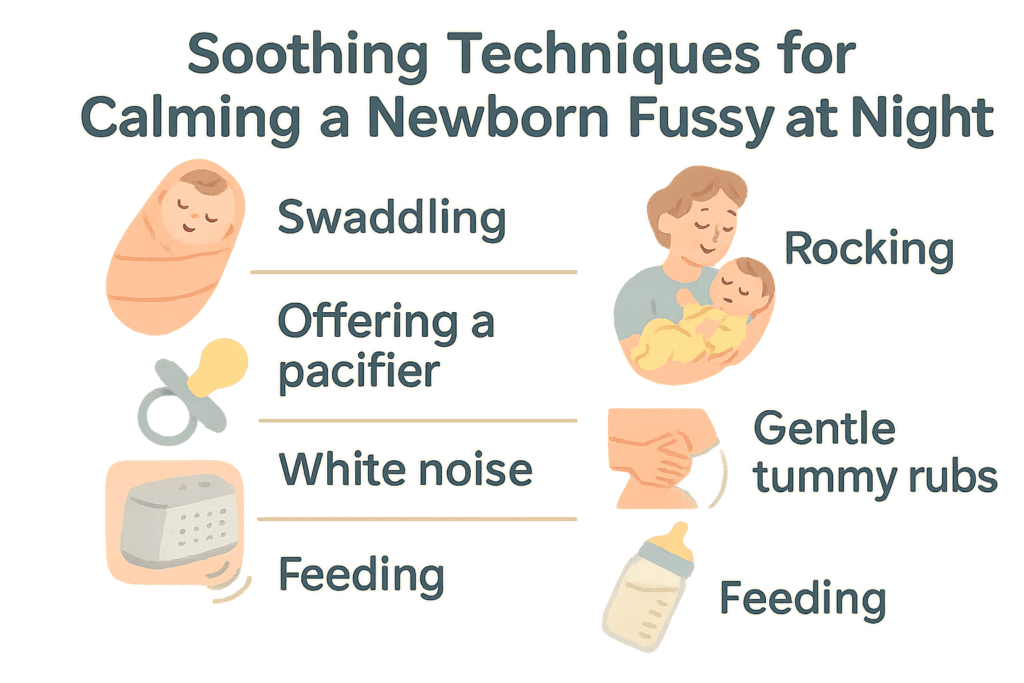
When dealing with a newborn fussy at night but not during the day, it helps to have a toolkit of calming techniques. Different babies respond to different methods, so try a few of these to see what comforts your little one:
- Swaddle the Baby: Wrapping your baby snugly in a swaddle blanket can make them feel secure and often calms fussiness. This simple technique can work wonders for a newborn fussy at night but not during the day. The gentle pressure mimics the womb and helps prevent the baby’s startle reflex from waking them.
- Rock or Sway: Use gentle motions to soothe your newborn. Rock in a chair, sway while holding baby, or use a baby swing (supervised). Gentle movement is very calming and can help settle a newborn fussy at night but not during the day, because it feels similar to the motions they felt in the womb.
- White Noise: Create a womb-like sound environment. Turn on a white noise machine, a fan, or a recording of heartbeat sounds. Steady noises like rain or a vacuum cleaner can also help calm a newborn fussy at night but not during the day when the house was louder. White noise helps drown out other disturbances and signals comfort.
- Feeding or Pacifier: Offer a feeding if it’s been a while – your baby may be hungry or thirsty. Even if not, sucking is soothing for babies. If your baby is fed but still fussy, a pacifier can satisfy their urge to suck and help calm a newborn fussy at night but not during the day.
- Burping and Gas Relief: Always check if gas is causing discomfort. Hold your baby upright and gently pat their back to get out burps after feeding. If they’re still squirmy, try laying them on their back and moving their legs in a “bicycle” motion or giving a tummy massage. Relieving gas can quickly soothe a newborn fussy at night but not during the day.
- Reduce Stimulation: If your newborn is fussy at night but not during the day, they may be overwhelmed by stimuli. Try moving to a dim, quiet room. Sometimes, just changing scenery to a calm, soothing environment will help your baby settle at night. A soft lullaby or shushing sound from you can replace loud background noise.
- Skin-to-Skin Contact: Strip baby down to their diaper and hold them against your bare chest. Skin-to-skin contact can magically soothe a newborn fussy at night but not during the day ( Why Newborn Babies are Fussy in the Evening – Mommy’s Bliss). They feel your body warmth and heartbeat, which often stops crying and helps them feel safe.
- Baby Massage: A gentle massage can relax your baby. Rub their back, arms, and legs softly. You can also try the “colic hold”—lay the baby face-down along your forearm with their head at your elbow and your hand supporting their belly. This pressure on the tummy can ease discomfort and calm crying.
- Warm Bath: If your newborn is fussy at night but not during the day, a warm bath in the evening can be calming. The warm water may ease tension (and help with gas). Follow up with a cozy swaddle and feeding; the baby might be relaxed enough to sleep.
Remember, a newborn fussy at night but not during the day is not trying to give you a hard time – they are having a hard time and need your comfort. Stay as calm as possible; your reassuring presence is the best soother. If you ever feel overwhelmed, laying your baby safely in the crib for a moment and taking a few deep breaths is okay. Ask your partner or a family member to help if possible so you can recharge. With these techniques, most fussy babies can be calmed eventually.
Sleep Strategies to Improve Nighttime Fussiness

Beyond immediate soothing, you’ll want to encourage better sleep habits so your baby isn’t fussy at night. Here are some sleep strategies for a newborn fussy at night but not during the day:
- Set a Bedtime Routine: Establish a simple, calming bedtime routine each night. For example, dim the lights, feed the baby, change into a clean diaper and pajamas, then rock or sing to them before laying them down. Doing the same pattern every evening cues your baby that it’s time to sleep.
- Differentiate Day and Night: Make days bright and active and nights dark and boring. Keep the room light during daytime feeds and play and engage with your baby. At night, keep the lights low and voices whisper-soft. This contrast will help fix day-night confusion and teach your newborn that nighttime is for sleeping.
- Avoid Over-Tiredness: Newborns shouldn’t be kept up too late. Watch your baby’s sleepy cues (yawning, rubbing eyes, zoning out) in the evening and put them to bed before they get overtired. Some babies need an earlier bedtime (e.g., 7 p.m.) to prevent meltdowns. Otherwise, you may have a newborn fussy at night but not during the day. An adequately rested baby will actually sleep better at night and be less fussy.
- Encourage Daytime Feeding: If your baby gets plenty of milk during the day, they may not need to eat as much at night. Feed your newborn every few hours during the day. This way, you’re less likely to have a newborn fussy at night but not during the day from hunger. It can reduce how often they wake up hungry in the middle of the night. (They might still wake for feeds – that’s normal – but regular daytime feeding sets a good foundation.)
- Use Swaddle and White Noise for Sleep: Swaddle your baby and use white noise in their sleep area at night. This combo helps recreate a womb-like, secure feeling and can lengthen their sleep stretches. A baby who sleeps a bit longer at night will have fewer opportunities to wake up fussy.
- Lay Baby Down Drowsy (When Possible): Once your baby is a few weeks old, you can occasionally put them down when they’re drowsy but not fully asleep. This teaches them to self-soothe and fall asleep on their own. It’s not always possible – and it won’t work if your newborn is very fussy – but try it during calmer moments. Over time, this skill can reduce nighttime crying because the baby might settle back to sleep without needing your help each time.
- Keep Night Interactions Calm: During night feedings or diaper changes, stay very calm and quiet. Don’t play or talk much. Take care of baby’s needs with gentle efficiency (feed, burp, change, cuddle) and then help them back to sleep. Not stimulating them too much at night reinforces the idea that nighttime is for quiet and sleep.
- Share the Soothing Duties: If you have a partner or support person, take turns at night so neither gets too exhausted. For example, one person can handle the 10 p.m. fuss, and another handles the midnight fuss. Being less stressed yourself will help you comfort your newborn fussy at night but not during the day more effectively.
Over time, using these strategies will gently guide your baby toward better sleep patterns. Remember that newborn sleep is irregular, and it’s normal for them to wake often (to eat, etc.). But the goal is to minimize unnecessary fussiness. By 3–4 months, many babies naturally start sleeping longer stretches at night as their circadian rhythm and brain mature. Your consistency now will pay off then.
Frequently Asked Questions (FAQs)
Q1: Is it normal for my newborn to be fussy at night but not during the day?
Yes, it’s very normal. Many infants are easy during the day but become a newborn fussy at night but not during the day come evening ( Why Newborn Babies are Fussy in the Evening – Mommy’s Bliss). This common phase (often called the witching hour) typically starts in the first few weeks of life and peaks around 6 weeks (My baby is fussy! Is something wrong? – KellyMom.com). As long as your baby is healthy, it’s usually nothing to worry about and will improve by around 3 months.
Q2: How long does the nighttime fussiness last in newborns?
Nighttime fussiness usually worsens around 6 to 8 weeks old and then gradually improves. Most babies outgrow the evening fussiness by 3 to 4 months of age (My baby is fussy! Is something wrong? – KellyMom.com). In the meantime, use soothing techniques to comfort your baby, and remember this phase of a newborn fussy at night but not during the day is only temporary.
Q3: What are the main causes of a newborn being fussy at night?
Key causes include an underdeveloped circadian rhythm (mixing up day and night), normal evening “witching hour” fussiness, overstimulation or overtiredness by day’s end, hunger or cluster feeding in the evenings, and gas or mild digestive discomfort. These can make a newborn fussy at night but not during the day when those factors aren’t as important.
Q4: What is the witching hour for babies?
The witching hour is a late afternoon or evening period when a baby becomes extremely fussy daily. Even a baby who is calm earlier may cry a lot during these hours. It often occurs roughly between 5 p.m. and 10 p.m. each day. The witching hour starts a few weeks after birth and is generally over by 3–4 months old, when babies have matured and the fussiness naturally subsides. This phenomenon is a major reason many babies end up newborn fussy at night but not during the day.
Q5: How can I soothe a newborn who is fussy at night?
Try swaddling your baby, rocking or walking with them, and using white noise to mimic the womb environment. Offer a feeding or pacifier to see if sucking calms them. Burp them well to release any gas. Also, keep the environment calm and dim. Techniques like skin-to-skin contact or a warm bath can help some babies. Every baby is different, so experiment gently with these methods to find what works to calm your newborn fussy at night but not during the day.
Q6: Should I keep my baby awake more during the day so they won’t be fussy at night?
No – keeping a baby awake all day can backfire. Newborns become overtired if they don’t nap, and overtired babies often cry more and have a harder time sleeping at night (Baby’s Witching Hour: Dealing With a Fussy Baby at Night). It’s better to let your baby nap when they need to. You can help with daytime/night confusion by making daytime naps bright and noisy and nighttime sleep dark and quiet, but don’t try to eliminate daytime sleep. A well-rested baby will actually be less fussy in the evening, whereas skipping naps can result in a newborn fussy at night but not during the day.
Q7: How can I help my newborn distinguish between day and night?
During the day, expose your baby to light and normal household noises, and interact with them. At night, keep lights low and minimize noise and interaction. For example, at night use a soft voice and avoid stimulating play. Over a few weeks, your baby will start to recognize that daytime is active and nighttime is quiet. This will help reduce the pattern of a newborn fussy at night but not during the day.
Q8: When should I be concerned about my baby’s fussiness at night?
If your newborn is fussy at night but not during the day, yet is feeding well, gaining weight, and can be consoled eventually, it’s likely normal. However, you should consult a pediatrician if the crying is inconsolable (nothing works to soothe them), lasts longer than 3–4 hours at a stretch, or if you notice other symptoms like fever, vomiting, very few wet diapers, or poor feeding. Also, talk to the doctor if the intense fussiness continues well beyond 4 months of age. In rare cases, excessive crying can indicate issues like reflux or milk allergy, so always check with your doctor if you’re worried.
Q9: Is my baby colicky or just going through a normal fussy phase?
If your baby’s crying is mainly concentrated in the evening hours and they are reasonably content the rest of the day, it’s likely the normal fussy phase (witching hour) rather than colic. Colic is usually defined by the “rule of 3s” (crying 3+ hours a day, 3+ days a week) and can happen at any time of day (Newborn Fussy at Night: Dealing With Witching Hour). Evening fussiness tends to be shorter-lived bouts that happen daily. If you’re unsure, check with your pediatrician, but most often, a newborn fussy at night but not during the day is simply experiencing the common witching hour and not full-blown colic.
Q10: Does switching from formula to breastmilk help with nighttime fussiness?
Switching feeding methods is usually not a cure-all for fussiness at night. Both breastfed and formula-fed babies can be fussy in the evenings. Breastfed babies might want to cluster feed more at night (which can be tiring but is normal), whereas formula-fed babies might have more gas discomfort – either can lead to fussiness. If you suspect something in baby’s diet is causing unusual fussiness (e.g., a sensitivity to a formula ingredient or something in mom’s diet), discuss it with your doctor. But generally, you may still have a newborn fussy at night but not during the day regardless of feeding method, since this fussiness is developmental and not solely food-related. Ensuring your baby is fed on demand and burped well is the best strategy, regardless of breast or bottle.
Conclusion
Caring for a newborn fussy at night but not during the day can be tiring, but remember that it’s a common experience and a phase that will pass. Understanding the causes of a newborn fussy at night but not during the day (like day-night confusion and the witching hour) helps you stay calm and respond to your baby’s needs. By using soothing techniques – swaddling, rocking, white noise, and so on – and establishing healthy sleep habits, you can comfort your baby and gradually guide them toward more settled nights.
Above all, stay patient and kind to yourself. Your baby isn’t trying to upset you; they communicate the only way they know how. With consistency and much love, your little one will slowly adjust, and those late-night fussiness episodes will fade. In a few months, you’ll likely find that your newborn fussy at night but not during the day is now sleeping longer and everyone is feeling more rested. That newborn fussy at night but not during the day phase will finally be behind you. Until then, hang in there – you’re doing a great job, and this challenging stage is only temporary.



